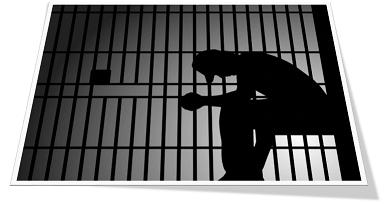Sin
Sin
We read in Hebrews 12:1, "Let us lay aside every weight and the sin which does so easily beset us."
The word of God refers to sin so many times in one way or another. Throughout the entire Bible we read of the horrible consequence of sin. First, we have the warning against sin. Man was personally forewarned by God in Paradise. Adam and Eve, as the jewels of God's creation, were perfect in the sight of God. He had created them and had brought them forth. "And God saw everything that He had made and, behold, it was very good."
As to how long it may have taken before man ate of the forbidden tree we do not know, but Adam and Eve enjoyed the perfect state in which they had been created long enough to know what communion with God was – no sin, no wrong thought, no angry word, no pain, no hellish punishment, no agony, no shame, no embarrassment. No punishment for sin then existed because sin itself did not exist. Adam talked with God; Adam's trust was entirely in God who had created him in knowledge, righteousness, and holiness. Yet, today, man is a sinner!
Sin has entered the world because man has let Satan have the right over him. We are the guilty ones. Our purpose in life is to honor God who has brought us forth, but because we have sinned, we are no longer able to do this as we ought. Thus the consequence is that the carnal mind is nothing but enmity against God (Rom. 8:7).
Sin is satanic. It was through Satan that we were deceived. Satan craftily chose the right place, the right time, the right words and the right creature to bring about his desired end. Remarkable it is that Satan chose the serpent, the creature of the dust today, to do the work for him. Not with a legion as in the man that dwelt among the tombs, but singularly he entered man. However, Adam (and we in him) did not ask God if it was permissible, for he knew to the fullest extent that it was forbidden.
Soon we see what the results of sin were:
- The conscience began to speak, for they "hid themselves." Fear was realized – Adam also saw that he was naked and was afraid of God.
- The ground was cursed for his sake, and Adam and Eve were sent forth from the Garden of Eden "to till the ground from whence he was taken" (Gen. 3:23).
- Man began to sin with more regularity: "And it came to pass, when they were in the field, that Cain rose up against Abel his brother, and slew him" (Gen. 4:8).
- The result is that we are now nothing but sin against God, "for we are not subject to the law of God, neither indeed can be" (Rom. 8:7). Man's nature is so corrupt that we blame God for our sins. Nevertheless, man is still responsible for his actions.
Let us hear what Christ says of us in Matthew 15, "Out of the heart proceed evil thoughts, murders, adulteries, fornications, thefts, false witness, blasphemies: these are the things which defile a man." It may seem like a dark picture, but it is only too true. To be sure, sin is an affront to God's law: "Whosoever committeth sin transgresseth also the law: for sin is the transgression of the law" (1 Jn. 3:4). God hates sin, but it also grieves Him that we sin: "And God saw that the wickedness of man was great in the earth, and that every imagination of the thoughts of his heart was only evil continually. And it repented the Lord that he had made man on the earth and it grieved Him at His heart" (Gen. 6:5, 6).
We are captivated by sin, in word, thought, and deed. Our words are no longer pure in God's sight. And who is able to describe what goes on in the heart, in the thoughts of man? I am sure it is best not to put in writing all the thoughts which the heart is full of by nature. Evil deeds are seen in children already at a very early age. But does this change when we become older and of understanding? To be sure, sins may differ in expression, but in nature they are the same. Yes, the older man becomes, if no change takes place in him, the more Satan-like he becomes. We are very much taken up with sin. It takes hold of us easily, for our heart is depraved. Much rather would we sin than be found on our knees or be found meditating on what we hear from Sunday to Sunday.
It is not enough to know we are a sinner; we must also be reconciled with God. We have to become the sinner. May we learn what it means: "He has wrought salvation" (Psalter 262). Then we will justify God and condemn ourselves.
There is only one way of absolution from sin for man, and that is through Jesus Christ who was born of man, to be like man, sin excepted. Because He has carried sin away, His people no longer need to endure the everlasting punishment of sin. It is the Spirit of God which teaches us that we are sinners. The more we learn to know God, who is sinless, the more we learn to know ourselves as sinners. We learn to cry with our instructors in Lord's Day 5, "Since then, by the righteous judgment of God, we deserve temporal and eternal punishment, is there no way by which we may escape that punishment, and again be received into favor?" (Heidelberg Catechism).
Yes, indeed, a way is opened wherein "the iniquity of Israel shall be sought for, and there shall be none; and the sins of Judah, and they shall not be found: for I will pardon them whom I reserve" (Jer. 50:20). God devised this day already from eternity without man's aid. Man has nothing to do with this. In re-creation, as in creation, man is passive, not active, for we read in Ephesians 2:1, "And you hath he quickened, who were dead in trespasses and sins." The more a person is made aware of being the sinner, the more he learns to know with James, "In many things we offend all" (James 3:2). But now the cry becomes more earnest as with Bartimaeus: "But he cried the more a great deal, Thou Son of David, have mercy on me" (Mark 10:48). For man, all hope is cut off. As Mephibosheth, he has no feet with which to walk. Our unbelief becomes greater than our faith: "Help thou my unbelief." As Rev. Van Reenen states: "When all hope is gone, deliverance is near." Oh, how blessed then man may come to this place with the Psalmist, "For I will declare mine iniquity, I will be sorry for my sin" (Ps. 38:18). "For godly sorrow worketh repentance to salvation, not to be repented of, but the sorrow of the world worketh death" (2 Cor. 7:10). At this point, sin loses its power. Here sin is swallowed up. Here sin is subdued, though not in man's conscience.
Whereas an unconverted person becomes more Satan-like, a converted person becomes more and more Christ-like by grace. His desire is not to sin, for he feels it is an offence to God. He knows he offends God with even the thoughts of sin. Does this mean that a converted person never sins? No, we read in 1 John 1:8, "If we say we have no sin, we deceive ourselves, and the truth is not in us." Here John includes himself. Also, in Ecclesiastes 7:20, Solomon confesses: "For there is not a just man upon earth that doeth good and sinneth not."
As in nature, the full ear of corn and grain ripens and bows its head lower and lower, longing to be harvested and gathered in – so much more in the realm of the Spirit, the soul longs to be where sin is blotted out forever, and for translation to be forever with God.
But the battle against sin remains as long as we are on this side of the grave. Upon concluding his autobiography, John Bunyan writes:
I find to this day, seven abominations in my heart:
Inclining to unbelief.
Suddenly to forget the love and mercy that Christ manifesteth.
A leaning to the works of the law.
Wanderings and coldness in prayer.
To forget to watch for what I pray for.
Apt to murmur because I have no more, and yet ready to abuse what I have.
I can do none of those things which God commands me, but my corruptions will thrust in themselves. When I would do good, evil is present with me.
These things I continually see and feel, and am afflicted and oppressed with; yet the wisdom of God doth order them for my good:
They make me abhor myself.
They keep me from trusting my heart.
They convince me of the insufficiency of all inherent righteousness.
They show me the necessity of flying to Jesus.
They press me to pray unto God.
They show me the need I have to watch and be sober.
And provoke me to pray unto God, through Christ, to help me, and carry me through this world.
 We have noticed a few things regarding sin from when it first came into the world until now. Satan is ever so crafty; he now has thousands of years of experience and knows how to keep sinners in his clutches. But there is one that is stronger that Satan. God is Almighty. Satan has at all times to give an account unto Him: "And Satan came also among them to present himself before the Lord" (Job 2:1).
We have noticed a few things regarding sin from when it first came into the world until now. Satan is ever so crafty; he now has thousands of years of experience and knows how to keep sinners in his clutches. But there is one that is stronger that Satan. God is Almighty. Satan has at all times to give an account unto Him: "And Satan came also among them to present himself before the Lord" (Job 2:1).
Though we are born in sin and shapen in iniquity, God is able to deliver us from the power of sin and Satan. Christ took upon Himself to help a helpless people. He has bowed lower than hell to support His people and to uphold them even from the jaws of the lions as with Daniel. For He has but to speak and it is, and to command and it stands firm. Oh, may our prayer be unto this great Deliverer; He is so worthy of our bowing before Him. "Come now, and let us reason together, saith the Lord: though your sins be as scarlet, they shall be as white as snow; though they be red like crimson, they shall be as wool" (Is. 1:18).
Satan allures, but God saves.
Satan deceives, but God is Truth.
Satan lets us go to hell, but God grants eternal life through Jesus Christ. God's people shall soon be delivered from this body of sin. "Blessed are they that do His commandments, that they may have right to the tree of life, and may enter in through the gates in the city" (Rev. 22:14). There sin is forever abolished.

Add new comment